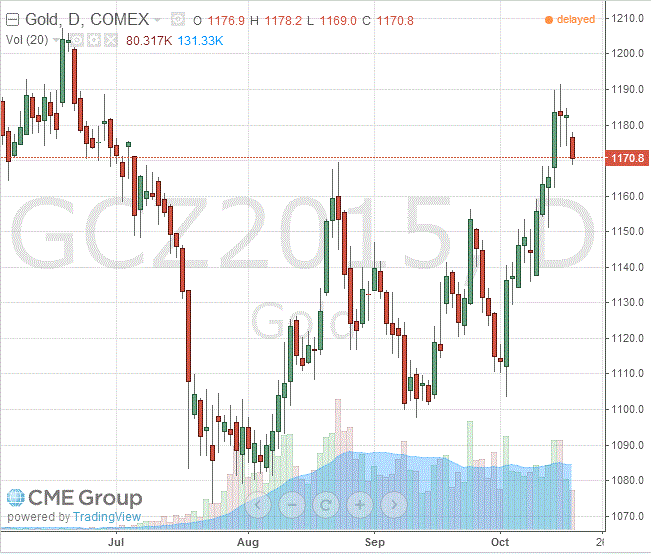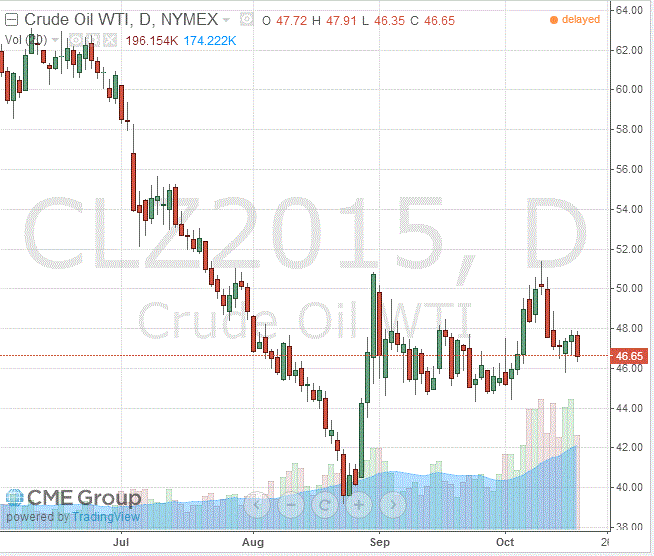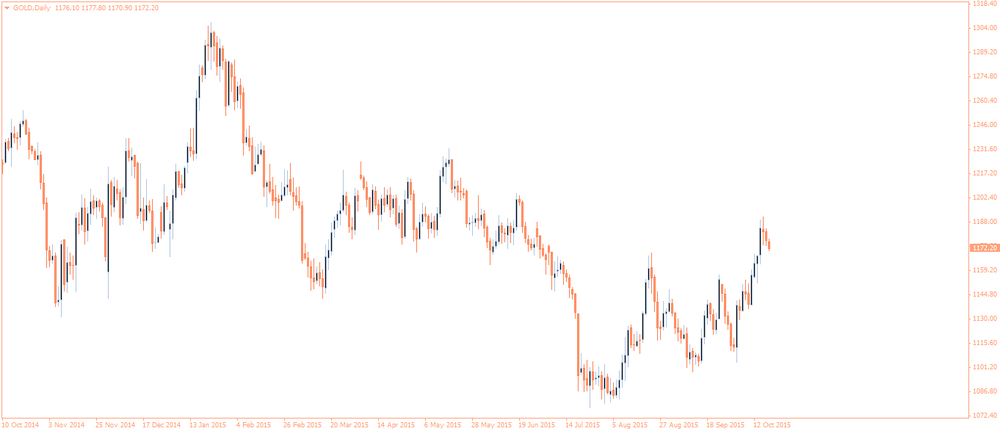Noticias del mercado
-
17:44
Oil prices fall on concerns over the global oil oversupply and the slowdown in the Chinese economy
Oil prices traded lower on concerns over the global oil oversupply and the slowdown in the Chinese economy. The National Bureau of Statistics said on Monday that China's economy expanded 6.9% in the third quarter, beating expectations for a 6.8% gain, after a 7.0% in the second quarter. It was the weakest growth since 2009.
China's industrial production increased 5.7% on year in September, missing expectations for a 6.0% rise, down from a 6.1% gain in August.
Comments by Iran's Oil Minister Bijan Zanganeh added to concerns over the global oil oversupply. He said on Monday that Iran would raise its oil production by 500,000 barrels a day after the nuclear deal is implemented.
Zanganeh also said that he does not expect the Organization of Petroleum Exporting Countries (OPEC) to cut its oil production at its next meeting on December 04. Iran's oil minister noted that the OPEC should lower its oil output to boost prices to a range of $70 to $80 a barrel.
Saudi Arabia's commercial crude oil inventories climbed to 326.6 million barrels in August from 320.2 million barrels in July, according to the Joint Organisations Data Initiative (JODI) data. It was the highest level since 2002.
According to the JODI data, Saudi Arabia' oil production fell to 10.27 million barrels a day in August from 10.36 million in July. Saudi Arabia said that its oil production totalled 10.23 million barrels a day in September.
Meanwhile, the number of the U.S. rigs declined again. The oil driller Baker Hughes reported on Friday that the number of active U.S. rigs declined by 10 rigs to 595 last week. It was the seventh consecutive decrease and the lowest level since the week ending July 23, 2010.
WTI crude oil for November delivery declined to $46.65 a barrel on the New York Mercantile Exchange.
Brent crude oil for November decreased to $48.90 a barrel on ICE Futures Europe.
-
17:26
Gold price declines on a stronger U.S. dollar and on the uncertainty over the Fed’s interest rate hike
Gold price declined on a stronger U.S. dollar and on the uncertainty over the Fed's interest rate hike. The Italian newspaper CorrierEconomia reported on Monday that New York Fed President William Dudley said last Thursday that it is too early for an interest rate hike by the Fed as the global economic growth is weak.
"It's true we thought we could raise interest rates by the end of 2015, but turbulence on financial markets, modest global growth, energy prices and macro-prudential imbalances are slowing this process down," he said.
The Chinese economic data also weighed on gold price. The National Bureau of Statistics said on Monday that China's economy expanded 6.9% in the third quarter, beating expectations for a 6.8% gain, after a 7.0% in the second quarter. It was the weakest growth since 2009.
China's industrial production increased 5.7% on year in September, missing expectations for a 6.0% rise, down from a 6.1% gain in August.
Fixed-asset investment in China climbed 10.3% year-on-year in the January-September period, after a 10.9% rise in the January-August period. Analysts had expected a 10.8% increase.
Retail sales in China increased 10.9% year-on-year in September, exceeding expectations for a 10.8% gain, after a 10.8% rise in August.
December futures for gold on the COMEX today fell to 1170.80 dollars per ounce.

-
14:49
Iran’s Oil Minister Bijan Zanganeh does not expect the OPEC to cut its oil production at its next meeting
Iran's Oil Minister Bijan Zanganeh said on Monday that he does not expect the Organization of Petroleum Exporting Countries (OPEC) to cut its oil production at its next meeting on December 04. He noted that the OPEC should lower its oil output to boost prices to a range of $70 to $80 a barrel.
Zanganeh pointed out that Iran would raise its oil production by 500,000 barrels a day after the nuclear deal is implemented.
-
11:19
China’s gold reserves rises by 14.9 tonnes in September
According to the People's Bank of China (PBoC) on Friday, China's gold reserves climbed by 14.9 tonnes to 1,708.5 tonnes in September, after a rise by 16.2 tonnes in August. China is the world's sixth largest gold holder.
Gold reserves in China make up only 1.7% of total reserves. The World Gold Council (WGC) said earlier this year that China should raise its gold holdings to around 5% of its total reserves.
-
11:11
Saudi Arabia's commercial crude oil inventories climb to 326.6 million barrels in August
Saudi Arabia's commercial crude oil inventories climbed to 326.6 million barrels in August from 320.2 million barrels in July, according to the Joint Organisations Data Initiative (JODI) data. It was the highest level since 2002.
Exports declined to 7 million barrels a day in August from 7.28 million in July.
According to the JODI data, Saudi Arabia' oil production fell to 10.27 million barrels a day in August from 10.36 million in July.
Saudi Arabia said that its oil production totalled 10.23 million barrels a day in September.
-
10:35
China’s economy expands 6.9% in the third quarter
The National Bureau of Statistics said on Monday that China's economy expanded 6.9% in the third quarter, beating expectations for a 6.8% gain, after a 7.0% in the second quarter. It was the weakest growth since 2009.
The growth missed the official target of 7%.
The tertiary industry climbed by 8.4% in the third quarter, while secondary industry increased by 6%.
"In order to restructure, the economy will face some downward pressure," a spokesman for the National Bureau of Statistics, Sheng Laiyun, said, adding that "all this indicates the restructuring and upgrading of the Chinese economy are going steadily".
-
10:20
The number of active U.S. rigs declines by 10 rigs to 595 last week
The oil driller Baker Hughes reported on Friday that the number of active U.S. rigs declined by 10 rigs to 595 last week. It was the seventh consecutive decrease and the lowest level since the week ending July 23, 2010.
Combined oil and gas rigs fell by 8 to 787. It was the lowest level since May 2002.
-
10:12
China’s industrial production increases 5.7% on year in September
The National Bureau of Statistics said on Monday that China's industrial production increased 5.7% on year in September, missing expectations for a 6.0% rise, down from a 6.1% gain in August.
Fixed-asset investment in China climbed 10.3% year-on-year in the January-September period, after a 10.9% rise in the January-August period. Analysts had expected a 10.8% increase.
Retail sales in China increased 10.9% year-on-year in September, exceeding expectations for a 10.8% gain, after a 10.8% rise in August.
-
09:06
Chinese data weighed on oil prices
West Texas Intermediate futures for November delivery fell to $47.45 (-0.57%), while Brent crude declined to $50.18 (-0.55%) amid China GDP data.
An official report showed on Monday that the economy of the world's second-biggest oil consumer expanded by 6.9% y/y in the third quarter. The reading was better than a 6.8% growth expected by economists, but it still missed the government's 7% growth target and intensified concerns over global oil demand.
-
08:53
Gold declined amid expectations for a Fed rate hike
Gold fell to $1,173.00 (-0.85%) as investors continued assessing upbeat U.S. inflation data released Thursday and preliminary consumer confidence data published on Friday. A report by University of Michigan showed improvements in consumer confidence strengthening expectations for a rate hike by the Federal Reserve. The Reuters/Michigan Consumer Sentiment Index rose to 92.1 in October beating expectations for an 89 points reading. However uncertainty over a potential rate hike persisted as recent data were mixed (U.S. industrial production fell by 0.2% m/m in September).
-
00:32
Commodities. Daily history for Sep Oct 15’2015:
(raw materials / closing price /% change)
Oil 47.260.00%
Gold 1,177.30-0.49%
-

